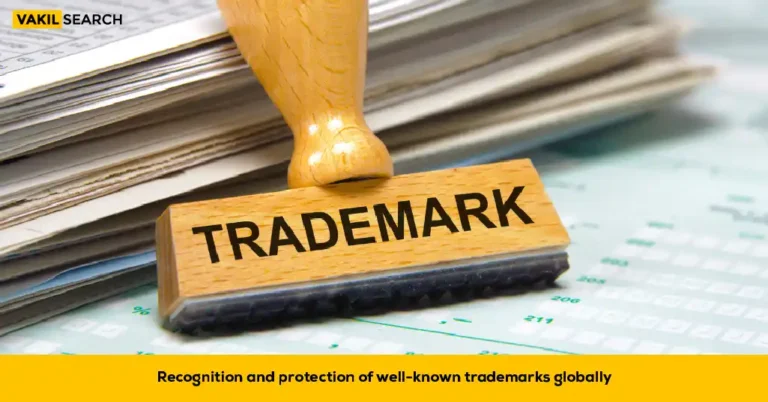Explore the significance of trademarks for startup companies. Understand how trademarks elevate brand visibility, credibility, and legal protection, playing a crucial role in establishing and growing a successful startup venture.
The hustle and bustle of a startup often centers around product development, securing funds, and targeting the right audience. But there’s an essential aspect that sometimes takes a backseat, though it deserves prime focus: a trademark. For both fledgling startups and established companies, a trademark can spell the difference between standing out or being lost in a sea of competitors. Learn the importance steps of Trademark for startups
The Significance of Trademarks for Startups
Starting a business is an exciting but uncertain adventure. While navigating various challenges, many entrepreneurs forget to protect their brand name, a key asset. This blog emphasises the crucial role of Trademark for Startups.
Understanding Trademarks: A Primer
At its core, a trademark serves as a unique identifier – be it a symbol, design, word, phrase, or a blend of these elements. This identifier sets apart the origin of a particular product or service, helping customers discern one brand from another. Beyond mere recognition, a trademark is a testament to a brand’s reliability and trustworthiness. To further cement its importance and ensure exclusivity, businesses can – and should – register their trademarks, thus availing legal safeguarding.
Important of Trademarking for Your Startup Company
-
Brand Protection:
Trademark registration provides startup companies with exclusive rights to use their brand name, logo, or slogan in connection with their products or services. This legal protection prevents competitors from using similar marks that could cause confusion among consumers or dilute the startup’s brand identity. By securing a trademark, startups safeguard their intellectual property assets and establish a unique identity in the market.
-
Establishment of Brand Recognition:
In a crowded marketplace, brand recognition is crucial for attracting customers and gaining market share. A distinctive trademark helps startup companies differentiate themselves from competitors and create a memorable impression on consumers. Through effective branding strategies and consistent use of their trademark, Trademark for Startups can build brand recognition and loyalty, driving customer engagement and repeat business.
-
Consumer Trust Building:
A registered trademark instills confidence and trust in consumers, signaling that a startup’s products or services meet certain quality standards and are backed by a reputable brand. Consumers are more likely to choose a product or service bearing a recognizable trademark, as it signifies reliability, authenticity, and professionalism. By investing in trademark registration, Trademark for Startups demonstrate their commitment to delivering value and earning the trust of their target audience.
-
Enhancement of Market Value:
Trademark registration adds tangible value to a startup company by creating an intangible asset that can be leveraged for growth and expansion. Investors, partners, and potential buyers are more inclined to engage with Trademark for Startups that have protected their intellectual property rights through trademark registration. A strong trademark portfolio enhances the market value of a startup, making it more attractive for investment, acquisition, or strategic partnerships.
-
Mitigation of Legal Risks:
Without trademark protection, startup companies are vulnerable to legal risks such as trademark infringement claims, brand disputes, and counterfeiting activities. These legal challenges can disrupt business operations, damage reputation, and incur costly litigation expenses. By proactively registering their trademarks, Trademark for Startups preemptively address potential legal threats and establish a clear legal framework for protecting their brand assets.
-
Facilitation of Market Expansion:
Trademark registration paves the way for Trademark for Startups to expand into new markets and territories with confidence. A registered trademark provides nationwide or even global protection, allowing Trademark for Startups to enter new geographic regions and reach diverse customer segments without fear of brand infringement. Through international trademark registration systems like the Madrid Protocol, Trademark for Startups can extend their trademark rights to multiple countries with ease, facilitating global market expansion.
Relevance of Trademarks for New Ventures/Startups
-
Safeguarding Your Brand’s Identity
Acquiring a trademark registration equips entrepreneurs with legal backing, ensuring the exclusive utilization of the brand mark for the registered goods or services. This exclusivity is vital. Why? It empowers Trademark for Startups to legally challenge any entity that dares to use a mark bearing resemblance, thereby averting potential brand confusion.
-
Cultivating Brand Distinctiveness
Amidst a sea of competitors, a robust brand acts as a beacon, drawing consumers towards it. A registered trademark not only accentuates brand distinctiveness but also augments its reputation. This heightened brand equity can be a magnet for customers, potential business collaborators, and even investors.
-
Looking Out for Potential Legal Disputes
The last thing a budding startup needs is to be embroiled in a trademark infringement lawsuit, an ordeal that can erode both its financial health and reputation. Armed with a registered trademark, Trademark for Startups have tangible proof of brand ownership. This not only provides protection against potential infringements but also deters imitators from encroaching upon your brand territory.
-
Strategising Global Expansion
A trademark isn’t just a domestic asset. When registered in one’s home turf, it can serve as a springboard for global brand protection. Given the global recognition of trademarks, businesses can seamlessly and economically extend their brand protection when treading international waters.
-
Augmenting Business Valuation
Beyond intangible value, a trademark carries tangible financial worth. As a tradable asset, it can be sold, leased, or franchised. Moreover, in the realm of finance, a trademark can be collateralised, enhancing a startup’s loan-acquisition capacity.
Eligibility Criteria for Different Trademark Registrations
- Joint Owners: If a company has joint owners, they can apply for a trademark. Both names should appear on the application.
- Proprietorship Firm: A sole proprietor can register a trademark under their name, excluding the names of the business and proprietorship. The application will treat the business and proprietorship names as separate entries.
- Partnership Firm: This refers to businesses run jointly by two or more individuals, sharing profits either equally or based on agreements, as per the Indian Partnership Act.
- Limited Liability Partnership (LLP): An LLP, having its distinct legal identity, can apply for a trademark under its name. Individual partners are not the direct applicants.
- Indian Company: Any type of Indian company should file the trademark application under the company’s name, given its separate legal identity. Thus, company directors cannot apply as individual trademark holders.
- Society or Trust: Trusts are formed through legal agreements with nominated trustees overseeing assets and operations, while societies arise when individuals unite for a shared purpose. Both entities can register a trademark, but it should be on the trust or society’s behalf.
- Individuals: Any person can apply Trademark for Startups to protect unique symbols or words under their name, irrespective of whether they run a business.
Conclusion
The journey of a Trademark for Startups or any company is fraught with challenges. However, one thing is clear: in a world where brand identity can make or break a business, securing a trademark isn’t just an afterthought it’s a business imperative. It not only shields your brand from potential infringements but also solidifies your position in the market, driving growth and fostering trust.
FAQs on Importance of Trademark for Startups
Why should a startup prioritize getting a trademark?
Startups, amidst numerous challenges, must prioritize trademarks to protect their brand identity, deter competitors from copying their branding, and lay a foundation for future expansions.
How does a trademark differ from a copyright or patent?
While all three provide intellectual property rights, trademarks protect brand symbols & names, copyrights protect artistic and literary works, and patents protect inventions.
How long does a trademark last?
In many jurisdictions, trademarks can last indefinitely as long as they're renewed, typically every 10 years, and are in use.
Can a trademark increase my company's value?
Yes, a recognised and well-protected brand can boost company value, both in terms of consumer trust and as an intangible asset for potential business deals.
Is a trademark valid globally?
Trademarks are territorial, meaning they protect your brand in the country of registration. However, there are mechanisms, like the Madrid System, which facilitate international trademark registration.










